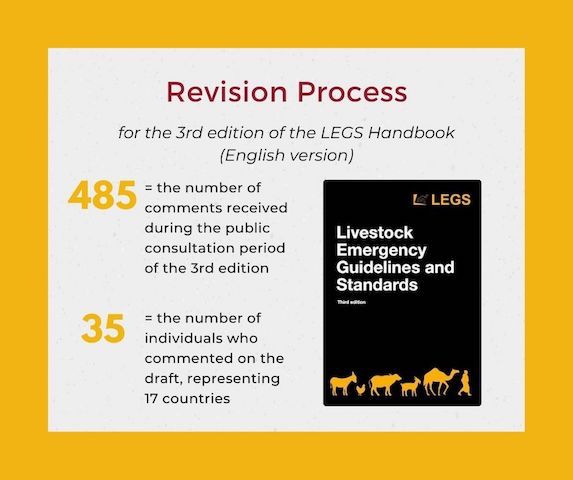Overview
The LEGS Handbook provides minimum standards and guidelines for use in responding to humanitarian emergencies, in support of the livelihoods of livestock-owning communities in lower- and middle-income countries.
Based on technical expertise and evidence-based good practice, the Handbook provides practical decision-making tools for planning a livestock emergency response. It outlines key actions and guidance notes for undertaking emergency interventions in six potential technical areas:
- Feed
- Water
- Veterinary support
- Shelter
- Livestock offtake
- The provision of livestock
Production
The 1st Edition
The development of the 1st edition of the LEGS Handbook was overseen by the LEGS Steering Group, based on contributions from expert authors for each technical area. A “consultation draft” of the Handbook was shared on the LEGS website for comment and feedback from the LEGS Community of Practice before the text was finalized and published in 2009.
In 2013 a consultation process was launched via the LEGS website and e-mail list to gather feedback on the 1st edition of the Handbook. Briefing papers were commissioned on new issues or key topics that needed enhancing, including: cash transfers; gender; climate change; animal welfare; livestock in camps; and resilience.
The Handbook was revised to incorporate the results of the consultation and the findings of these technical reviews. The language was also edited for clarity and accessibility, and a new design and format were commissioned to make the updated Handbook clearer and easier to use. The second edition of LEGS was published in 2014.

From 2019 to 2021 a range of activities provided feedback on the 2nd edition, in preparation for the revision of the Handbook. These included:
- Seven discussion papers on key topics: nutrition, gender, veterinary pharmaceuticals, livestock insurance, livelihoods and resilience, COVID-19, and localization, together with a webinar series on the same topics
- Consultation Workshops held in Mali, Kenya, the Philippines, India, and Nicaragua
- Online survey on the 2nd edition Handbook
- Discussion paper on “How to Make LEGS More User Friendly”
- Review and updating of the LEGS Evidence Database
Drawing on these outcomes, the 3rd edition of the Handbook was revised and updated. It was released on 27th June 2023.
Key improvements include:
- expanded guidance on response planning, creation of LEGS Principles (to replace the former core standards and cross-cutting issues)
- greater emphasis on preparedness through the creation of new technical standards; and
- increased information on cash and voucher responses.
The Handbook was redesigned with the emphasis on accessible formatting and language, with case studies now presented on a dedicated web page.

